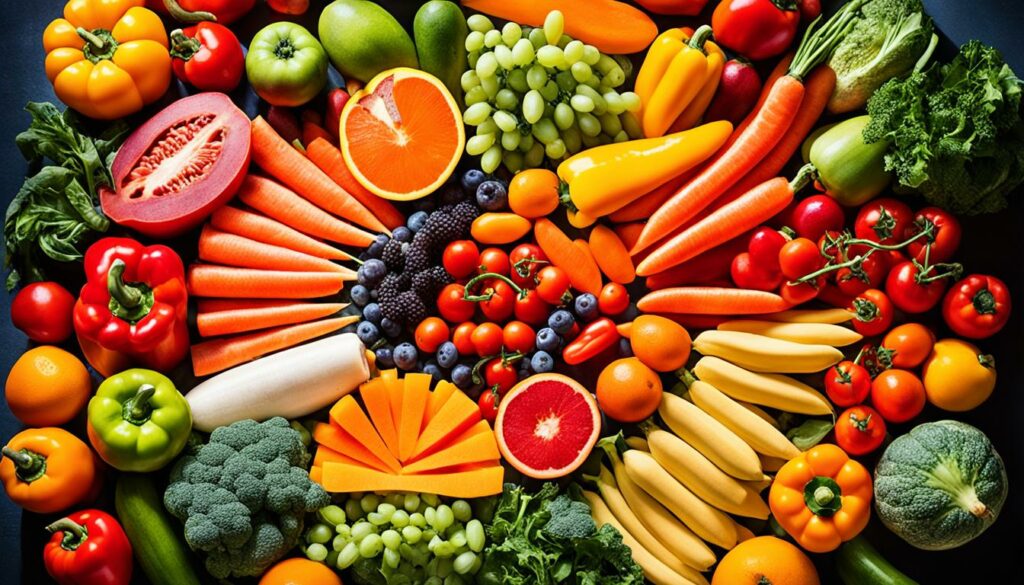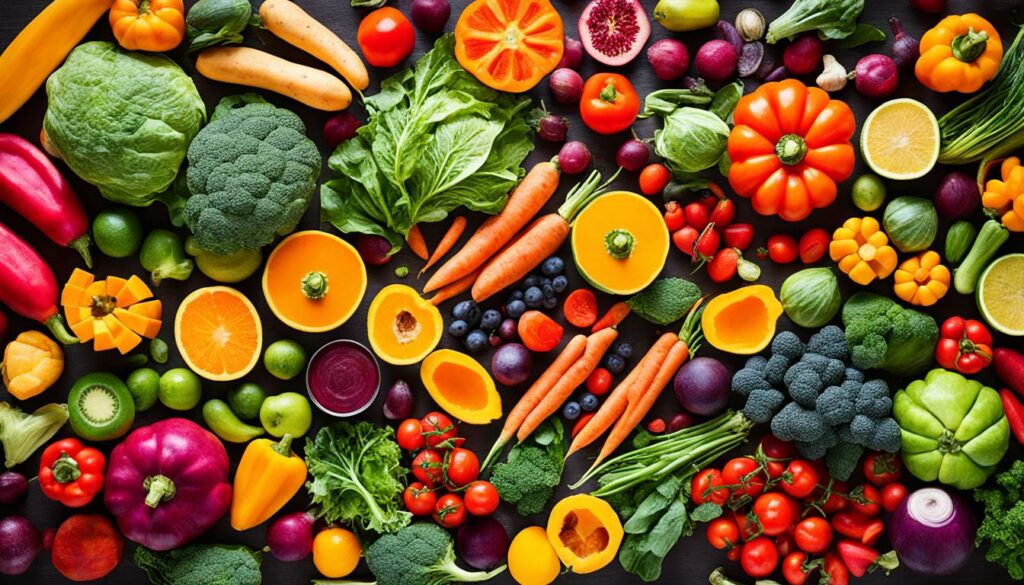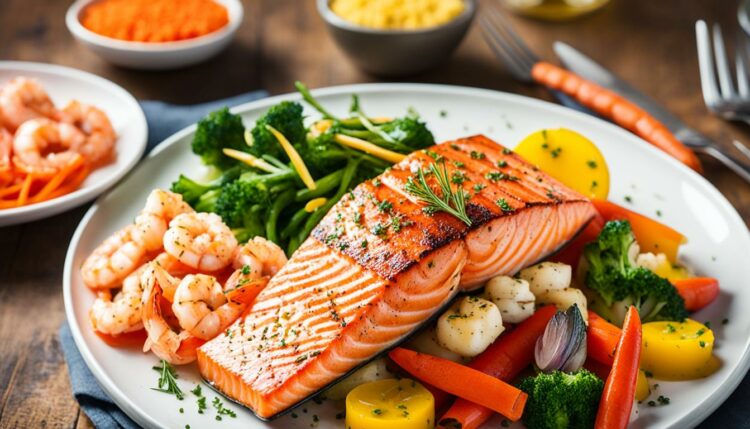Did you know that astaxanthin, a powerful antioxidant, offers a wide range of health benefits? This natural compound is found in specific foods and can play a crucial role in enhancing your overall well-being.
By incorporating astaxanthin-rich foods into your diet, you can take advantage of its incredible properties and improve your health in various ways.
Astaxanthin is known for its ability to combat oxidative stress, support cardiovascular health, promote brain function, enhance skin health, and even aid in weight loss. As a carotenoid, it is 10 times more potent than other carotenoids and a whopping 1000 times more powerful than vitamin E.
In this article, we will explore the best sources of astaxanthin, uncover its benefits, and provide valuable insights into incorporating this antioxidant into your daily routine.
Whether you choose to consume astaxanthin-rich foods or consider supplement options, we will guide you towards achieving optimal intake for a healthier and more vibrant life.
Key Takeaways:
- Astaxanthin is a potent antioxidant that offers a wide array of health benefits.
- It is found naturally in certain foods, making it essential for you to include them in your diet.
- Astaxanthin-rich foods can help improve cardiovascular health, brain function, skin health, and aid in weight loss.
- If obtaining sufficient astaxanthin through food alone is a challenge, supplements can provide a convenient option.
- Remember to consult a healthcare professional before starting any supplementation regimen.
What is Astaxanthin and Its Benefits?
Astaxanthin is a powerful carotenoid compound found naturally in plants and animals. It is known for its vibrant red color and its exceptional antioxidant properties. Among carotenoids, astaxanthin stands out as one of the most potent antioxidants, providing a wide range of health benefits.
As an antioxidant, astaxanthin plays a crucial role in neutralizing harmful free radicals in the body, protecting cells from oxidative stress and damage. It is ten times stronger than other carotenoids, such as beta-carotene, and even surpasses the antioxidant power of vitamin E by a thousand times.
By incorporating astaxanthin into your diet, you can experience numerous health benefits. Here are some of the key advantages:
1. Reducing Oxidative Stress:
Astaxanthin’s potent antioxidant properties help reduce oxidative stress, a condition caused by an imbalance between free radicals and the body’s ability to neutralize them. By combating oxidative stress, astaxanthin supports overall cellular health and longevity.
2. Supporting Cardiovascular Health:
Studies have shown that astaxanthin may help maintain cardiovascular health by reducing oxidative damage to blood vessels, promoting healthy blood flow, and supporting optimal cholesterol levels.
3. Improving Skin Health:
Astaxanthin has gained popularity as a skincare ingredient due to its ability to support skin health. It helps protect the skin from UV-induced damage, reduces the appearance of wrinkles and age spots, and promotes a youthful complexion.
4. Enhancing Eye Health:
The antioxidant and anti-inflammatory properties of astaxanthin make it beneficial for eye health. It helps protect the retina from oxidative damage, reduces the risk of age-related macular degeneration, and supports overall vision health.
5. Promoting Brain Health:
Astaxanthin has shown promising effects on brain health, including neuroprotective properties, improved cognitive function, and enhanced memory. It helps combat oxidative stress in the brain and supports optimal brain function.
Overall, astaxanthin is a nutrition powerhouse with incredible antioxidant capabilities. By incorporating astaxanthin-rich foods or supplements into your diet, you can enjoy these health benefits and support your overall well-being.
Natural Sources of Astaxanthin
Astaxanthin, a potent antioxidant, can be obtained from various natural sources, each offering its own unique benefits. Incorporating these sources into your diet can help boost your overall health and well-being.
Krill Oil
Krill oil is an excellent source of astaxanthin. These small shrimp-like creatures are rich in this powerful antioxidant, making krill oil a popular dietary supplement. Consuming krill oil can help support cardiovascular health and reduce inflammation in the body.
Salmon
Salmon is another natural source of astaxanthin. Wild-caught salmon, particularly sockeye salmon, contains high levels of this antioxidant. Including salmon in your diet can help improve skin health, support brain function, and promote heart health.
Phaffia Yeast and Green Algae
Phaffia yeast and green algae are also rich sources of astaxanthin. Phaffia yeast is known for its high astaxanthin content and has activities approximately 10 times stronger than other carotenoids.
Green algae, specifically Haematococcus pluvialis, accumulates astaxanthin under certain conditions. Incorporating these sources into your diet can provide you with a natural supply of this powerful antioxidant.
Shrimp and Other Seafood
Shrimp and other crustaceans are natural sources of astaxanthin. These seafood options can provide you with a good amount of this antioxidant. Including shrimp and other seafood in your diet not only adds astaxanthin but also contributes to your overall protein intake and supports a healthy diet.
Incorporating these natural sources of astaxanthin into your diet can help enhance your health and well-being. Whether it’s through krill oil, salmon, Phaffia yeast, green algae, or shrimp, these natural sources offer a convenient way to obtain this powerful antioxidant.

Astaxanthin-Rich Seafood
Seafood, particularly certain types of fish and crustaceans, is rich in astaxanthin, a powerful antioxidant known for its health benefits. Incorporating astaxanthin-rich seafood into your diet can help boost your overall well-being.
Salmon, both wild-caught and farmed, is an excellent source of astaxanthin. It not only provides a vibrant pink color but also contains significant amounts of this antioxidant. Enjoying a grilled salmon fillet or adding smoked salmon to your salad can help increase your astaxanthin intake.
“Salmon, both wild-caught and farmed, is an excellent source of astaxanthin.”
In addition to salmon, other seafood options also offer astaxanthin. Shrimp, eel, red sea bream, and red snapper are examples of astaxanthin-rich seafood. These delicious options provide both the benefits of astaxanthin and a variety of essential nutrients that support your overall health.
Astaxanthin-rich seafood not only offers antioxidant benefits but also supports cardiovascular health, promotes skin health, and enhances brain function. It is a flavorful and nutritious addition to your diet.
Astaxanthin-Rich Seafood Nutritional Content Comparison
| Seafood | Astaxanthin Content |
|---|---|
| Salmon | High |
| Shrimp | Moderate |
| Eel | Moderate |
| Red Sea Bream | High |
| Red Snapper | Moderate |
As the table shows, salmon and red sea bream have a high astaxanthin content, making them excellent choices for maximizing your intake of this powerful antioxidant.
Next time you plan your seafood menu, consider incorporating astaxanthin-rich options like salmon, shrimp, eel, red sea bream, and red snapper, and enjoy the taste and health benefits that they offer.
Land-Based Sources of Astaxanthin
Apart from seafood, there are other natural sources of astaxanthin that you can include in your diet. Phaffia yeast and green algae are two prominent examples of land-based sources of this beneficial compound.
Phaffia yeast is a natural source of astaxanthin and is known for its exceptional antioxidant properties. It contains astaxanthin with activities approximately 10 times stronger than other carotenoids. Including Phaffia yeast in your diet can provide you with a concentrated dose of this powerful antioxidant.

Green algae, specifically Haematococcus pluvialis, is another natural source of astaxanthin. Under certain conditions, such as exposure to high light and nutrient stress, green algae can accumulate high levels of astaxanthin. Adding green algae to your diet can be an effective way to increase your astaxanthin intake.
Astaxanthin Supplements
While incorporating astaxanthin-rich foods into your diet is beneficial, it may not always be possible to obtain optimal levels of astaxanthin through food alone. In such cases, astaxanthin supplements can be an effective option.
These supplements provide a concentrated dose of astaxanthin, ensuring you reach the desired intake. However, it is important to note that supplements should be used in consultation with a healthcare professional and should not replace a balanced diet.
Conclusion
Astaxanthin-rich foods offer numerous health benefits and should be included in your diet for overall well-being. Incorporating seafood, such as salmon and shrimp, into your meals can provide ample amounts of astaxanthin.
These natural sources not only enhance the flavor of your dishes but also provide you with the powerful antioxidant properties of astaxanthin.
For those seeking alternative options, land-based sources such as Phaffia yeast and green algae can be added to your diet. These nutritious ingredients offer a sustainable way to incorporate astaxanthin-rich foods into your lifestyle.
If obtaining sufficient astaxanthin through diet alone is challenging, supplements can be a convenient solution.
Astaxanthin supplements provide a concentrated dose of this antioxidant, ensuring you meet your optimal intake. However, it is important to consult with a healthcare professional before starting any supplementation regimen.
By incorporating astaxanthin foods into your diet, either through natural sources or supplements, you can enhance your overall well-being. The health benefits of astaxanthin, including its powerful antioxidant properties, make it a valuable addition to any balanced diet.
Take charge of your health and enjoy the benefits of this remarkable nutrient today!
FAQ
What are the best sources of astaxanthin?
The best sources of astaxanthin are seafood such as krill oil, salmon, shrimp, eel, red sea bream, and red snapper. Land-based sources include Phaffia yeast and green algae.
What are the benefits of astaxanthin?
Astaxanthin offers several health benefits including reducing oxidative stress, supporting cardiovascular health, improving skin health, enhancing eye health, and promoting brain health.
How much astaxanthin should I consume?
There is no specific recommended daily dosage for astaxanthin. However, supplements generally provide around 4-12 mg per serving. It is best to consult a healthcare professional for personalized advice.
Can astaxanthin help with weight loss?
While astaxanthin has been linked to various health benefits, there is limited research on its specific effects on weight loss. However, its antioxidant properties may support overall well-being, which can indirectly contribute to a healthy weight.
Can I get enough astaxanthin through my diet alone?
While incorporating astaxanthin-rich foods into your diet is beneficial, it may not always be possible to obtain optimal levels of astaxanthin through food alone. In such cases, astaxanthin supplements can be an effective option.
How do astaxanthin supplements compare to natural sources?
Astaxanthin supplements provide a concentrated dose of astaxanthin, ensuring you reach the desired intake. However, supplements should not replace a balanced diet and should be used in consultation with a healthcare professional.




